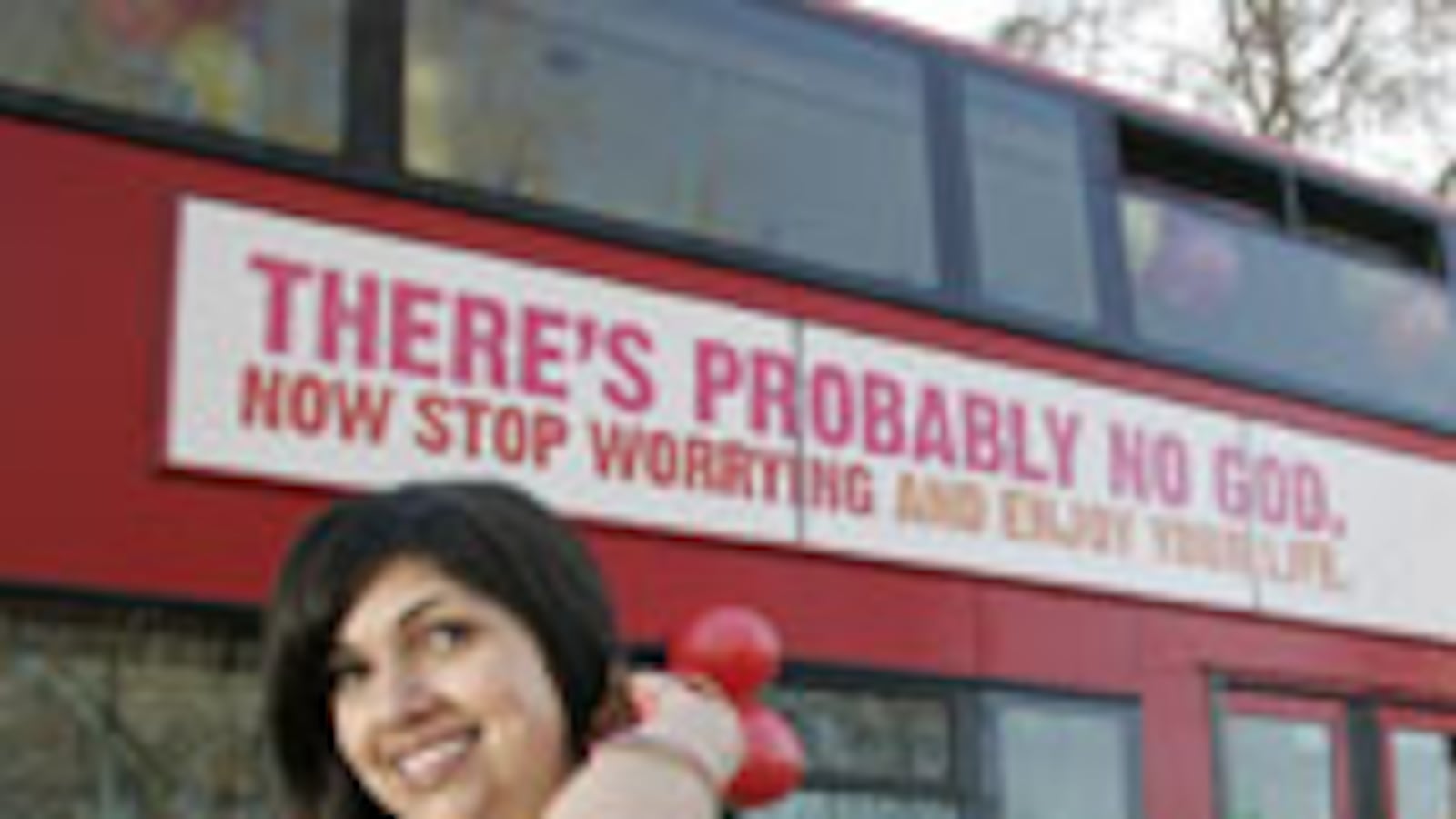
America has long dotted its landscape with billboards that advocate a relationship with God. (A Southern favorite: “If you think it's hot here, imagine hell.”) Ads that suggest shunning Him, however, are newer territory.
Yet last week, a consortium of atheist groups rolled out an ad campaign doing just that. Coming a year after London’s city buses were plastered with adverts that stated flatly, “There’s probably no God. Stop worrying and enjoy your life,” New York City’s subway trains were plastered with similar ads asking bleary-eyed commuters, “Are you good without God?”
It’s the latest promotional push by a special interest group that has grown increasingly vocal. Over the past couple of years, atheists have come to see themselves as a cohesive demographic that should advocate on its own behalf. And such efforts seem to be working—the American Religious Identification Survey recently found that the number of people who claimed “no religion” had nearly doubled recently, to 15 percent.
“We’ve been being nice for decades and look where it’s got us. Now that we’ve been taking the gloves off, we seem to be getting somewhere.”
“We've been being nice for decades and look where it’s got us,” says Richard Dawkins, the author and biologist who has perhaps become atheism’s loudest activist, and who was behind the London bus ads. ”Now that we've been taking the gloves off, we seem to be getting somewhere.”
But not all atheists are comfortable preaching the gospel of the nonbeliever. After all, the New York advertising effort could be seen as something most atheists consider repugnant: evangelizing. Dawkins admits to his own zealotry in his fight against what many atheists call irrationalism in his latest book, The Greatest Show on Earth, in which he compares creationists to Holocaust deniers. “I think it’s reasonable to carry on with a certain amount of zeal when there's evidence that people out there still don't get it,” he says.
But should atheists proselytize with a passion akin to the loudest bible thumpers? It’s a question that has divided the atheist community into two schools of thought. And ironically, it’s a split that somewhat resembles the one among born-again Christians, between those who advocate a fire-and-brimstone approach (“Accept Jesus or burn in hell”) and those who want to bring newcomers into the fold with a gentler message that sells a warmer (and, in the case of younger Christians, cooler) brand of Christianity. For some atheists, the very idea of aggressively spreading the word of no-God is practically sinful.
These two philosophies are fracturing organizations at the top of the atheist activism food chain. Consider the Center for Inquiry, atheism's top think tank and one of the groups behind New York’s “Good Without God” campaign. The Center’s founder, Paul Kurtz, one of humanism's eminences grises, preaches maximum tolerance. His life's aim, he told me, is to “make it so a person can be a nonbeliever in our society and be respected and accepted.” As such, he thinks it’s counterproductive to preach against religion. “You can't begin by calling people names,” says the 85-year-old Kurtz. “It's self-destructive to nonbelievers.” When Kurtz’s own organization supported international “Blasphemy Day” in September (a day dedicated to openly criticizing all things God), Kurtz wrote a column in Free Inquiry magazine, an atheist publication put out by the Center for Inquiry, comparing the day to “the anti-Semitic cartoons of the Nazi era.” He continued, “There are some fundamentalist atheists who have resorted to such vulgar antics to gain press attention.”
One of Blasphemy Day's supporters was, in fact, Tom Flynn, Free Inquiry’s editor-in-chief and Kurtz's colleague at the Center. Flynn sees a loud, proud, and socially unacceptable atheism as the best chance to achieve Kurtz's declared goals. He also draws constructive parallels to the raucous gay-rights movement of the 1970s and ‘80s. “If you think back to deliberately outrageous activism like ACT UP and Queer Nation, somehow after 10 years, gay was mainstream,” he says. “There were gay characters on sitcoms. How did this happen? That brashness and outrageousness, it desensitized America. It got everybody over that taboo.”
Such outrageousness, especially when it's fueled by outrage, is always a risky public-relations strategy, but atheism, for all its progress, needs to do something to change its image. Some atheists wonder if, despite their recent growth in numbers, their still relatively small representation in the U.S. is due to the label itself: “atheist,” like “feminist,” is a problematic term to many, even to people who will say freely they don't believe in God. Even if more than 15 percent of the population believes in what the word represents, they may be loathe to embrace a label that is often preceded by the adjective “rabid.”
The New York subway ads are an example of more moderate activists trying to soften atheism’s image. (New York’s “Are you good without God?” has a lighter touch than London’s “There’s probably no God,” which Dawkins originally resisted as too equivocating.) They’re a tie-in with a new book by the movement's No. 1 Mensch, Greg Epstein, Harvard's Humanist chaplain. (Yes, they have such things in Cambridge). Epstein is surely the first humanist philosopher to get a Grisham-style ad campaign pitching his book, Good Without God: What a Billion Nonreligious People Do Believe.
In my own reporting on Evangelical America, I've had occasion to read more than a few books that make up the massive Christian publishing industry. Most tend to share a few common traits: self-deprecating humor, a sprinkling of pop-culture references, testimonial doubt, second-person interrogations. Epstein has adapted the same model for nonbelievers, though he suggested to me that such influences were unintentional. “I don't consider myself evangelical,” he says. “I'm not out here trying to win souls.” He is, however, trying to build a movement, and Good Without God instructs readers in just how to do that: how to talk to people about Humanism, how to hold meetings in your home, how to write effective flyers—in other words, how to build a religious movement that doesn’t include religion.
Though Epstein says he admirers some of the work of the more aggressive atheists like Dawkins and Hitchens, his mission is to define nonbelievers more positively, to emphasize goodness. “I'm certainly not interested in destroying religion,” he says. That mentality is what some atheist thinkers believe quietly promotes magical thinking, condoning it via liberal tolerance. Dawkins quotes British journalist Johann Hari: “I respect you too much to respect your ridiculous beliefs,” he says. “And I don't think that ridiculous beliefs deserve respect. The evidence says it doesn't seem to get us anywhere.”
While Dawkins can see a political case to be made for the tolerant-humanist approach, he says that it is his writing—along with colleagues Hitchens and Sam Harris—and not the kinder, gentler voices of atheism, that is actually effecting change, and public relations be damned. Plus, he says, his work is hardly radical—it's only perceived as extremist because of the relative silence of people who question that faith is truth. “I think the illusion of stridency—you almost can’t use the word 'atheism' without preceding it with 'strident'—comes from the long period where it simply wasn't done to criticize religions.”
Barry Kosmin, who directs the Institute for the Study of Secularism in Society and Culture, suggests that neither active approach will ultimately be successful in mainstreaming atheism. “My own belief is that actual religion will be hurt more by creating a climate of indifference,” he says, imagining a time when godlessness will be met by nothing more than a shrug. Kosmin says we're not far from that now, especially if you take a historical perspective.
“This culture war is pretty low key,“ he says. “You want real culture war? Try the Spanish Civil War. That's a real secular clash. Great armies yelling we'll burn down your churches! and then actually doing it.” Not even ACT UP went that far.
Lauren Sandler is the author of Righteous: Dispatches from the Evangelical Youth Movement. She has contributed journalism and opinion about culture, politics, and religion for many publications, including The Atlantic, The New Republic, Slate, The Nation, Mother Jones, and The New York Times.






